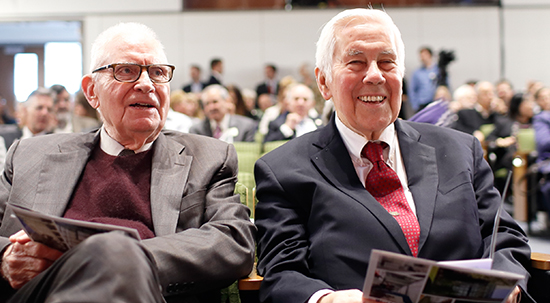
Former U.S. Senator Richard Lugar and DePauw University alumnus and former U.S. Congressman Lee Hamilton will be speaking on how to restore bipartisanship in the United States at 7 p.m. in Meharry Hall this Thursday.
Hamilton ‘52, a member of the Democratic Party, represented Indiana in Congress for 34 years. He currently works at Indiana University, advising their Center on Representative Government as well as using his background in politics to help teach in Indiana University’s School of Public and Environmental Affairs.
Lugar was the Republican representative for Indiana in the Senate from 1977 to 2013. His work in the senate focused on foreign relations and the disarmament of nuclear, chemical, and biological weapons, most notably through the Lugar-Nuun Cooperation Threat Reduction Act.
The event will be moderated by Miranda Spivack, the Eugene S. Pulliam Distinguished Visiting Professor of Journalism.
“These two have come up in an era where there was bipartisanship; Democrats talked to Republicans, they worked together,” Spivack said. “Even though there was contention and fights, they ultimately pulled things off. You know, in those situations, nobody wins and everybody wins. You don’t get what you want, but you get some of what you want.”
Spivack hopes that this event will draw in a large audience and give them the opportunity to be exposed to a discussion that is very timely for our era, focusing on how it is possible for the government to function more democratically and politely.
Spivack said that one of the more relevant things affecting politics these days is civic education. She notes that in order to be an informed voter, students need to “understand the government, how supreme court justices are picked, the role of the president, the role of the house, and the same role on the state level.”
“Once you are educated about these things and how they work, you are a better-informed citizen and you will make better informed decisions when you vote. That is something that Lugar and Hamilton have been talking about, which is the lack of civic education in this country,” Spivack said.
Spivack was not the only person who expressed this sentiment about the importance of educating voters. Matthew Cummings, director of assessment and Compton Center for Peace and Justice, said that it is important for voters to not only know the role of the government, but also how to interact with people of opposing views.
Cummings hopes for Hamilton and Lugar to talk about how people should be able to sit down with others who have opposing views and be able to listen.
“A major topic that they need to hit back on is how we learn to sit down and talk to one another without making assumptions,” Cummings said. “[To discuss] how to figure out how to get people to stop over-generalizing about who they are talking to.”
